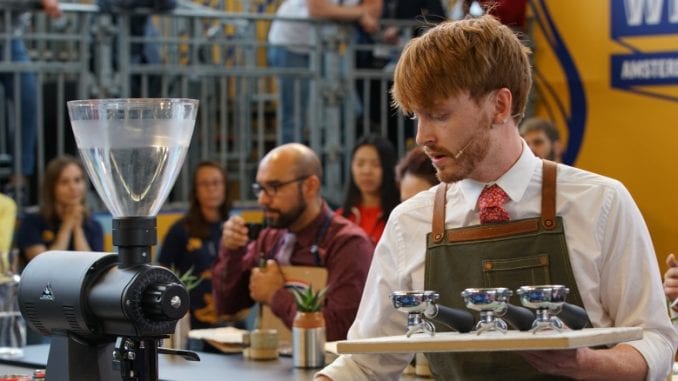
World Barista Champion finalist Cole Torode of Canada talks about how to get rid of nerves, the coffee scene in Calgary, and how to turn around a barista routine in less than a month.
BY ASHLEY RODRIGUEZ
BARISTA MAGAZINE ONLINE
Cover photo by Jeff Han for World Coffee Events
Cole Torode of Rosso Coffee Roasters became the barista champion of Canada only weeks before the 2018 World Barista Championship in Amsterdam in June. Cole has been competing since 2011, and this is his first year on the world stage. In this interview, he talks to us about the coffee he used, what he tells people when they ask if he’s nervous, and how he hopes the coffee scene grows in Calgary (where he’s from and currently works) and in Canada as a whole.
Ashley Rodriguez: Tell us about how you got into coffee.
Cole Torode: I’ve been working in the coffee industry for right around 10 years. When I graduated high school, I had the dream of traveling and getting a different perspective on the world. My timing was really poor and the economic downswing hit hard in Calgary, the city I was born in and continue to live in today. My family had some complications and I no longer felt it appropriate to disappear for a year or perhaps more. So I stayed home and I looked for work instead. I landed at a mom-and-pop coffee establishment, and after a few months I asked my brother David for a job at Rosso, a neighborhood-focused coffee shop he had started two years prior. I really began to enjoy working in coffee and learning about its nuance. I especially loved the hospitality side, and after about a year I found out about coffee competitions. As a competitive guy who has always played sports, this gave me the foundation and platform to learn more about the craft of coffee.
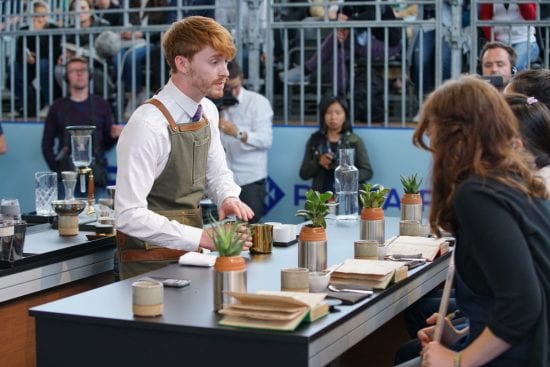
After assisting in build out our roasting program in 2011, I became a partner at Rosso Coffee Roasters. Fast forward to today, and my focus is on sourcing and procuring our coffee menu, so I travel often and currently purchase from and work with producers in seven countries globally. This portion of my job is amazing to me and fulfills my initial dream of traveling. Though it took a lot of hard work to establish, I’m constantly wowed seeing the world through the eyes of coffee producers in vastly different countries. This work has given me perspective on how global our community is and how important it is to share the stories and shine light on different situations and circumstance. When I’m in Calgary I’m part of our quality-control team, coffee education and barista training, and my non-coffee roles are in web development, social media, and I’ve somehow garnered the title of “grammar and spell checker.”
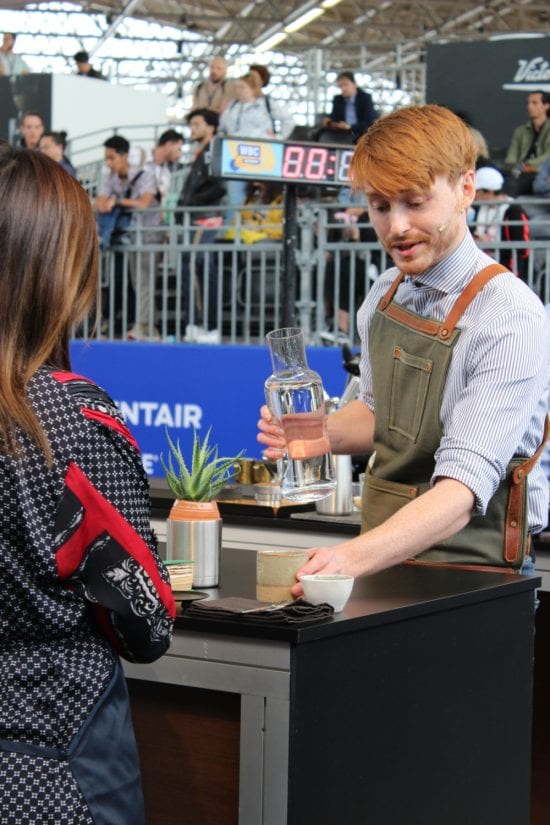
AR: Why did you decide to compete?
CT: I originally decided to compete because I felt it was a great way to learn and advance in the world of coffee. Early on I realized the importance of the technical side of competition and really honed in on those elements. As a mostly self-taught barista, I found the most value there, and I realized that as I was learning and growing through this platform, the baristas I was working with were also benefiting. So that’s why I’ve continued to compete year after year since 2011.
AR: Can you tell us about the coffee you used?
CT: This year for WBC I used two coffees, both from La Palma y El Tucan (LPET). I first met Sebastian, the relationship manager at LPET, in late 2015 while I was sitting at Libertario, the coffee shop they have in Bogotá. As we chatted, he invited me and my brother to visit the farm, but sadly our flight was later that day and timing wasn’t quite right. In early 2017, I reached out to Sebastian to reconnect and to source a coffee for the Canadian National Barista Championship. I was fortunate to have the opportunity to visit the farm in August and went home with a beautiful Lactic Gesha. This is the first of the two coffees I used; however, a fresher crop harvested during the mitaca.
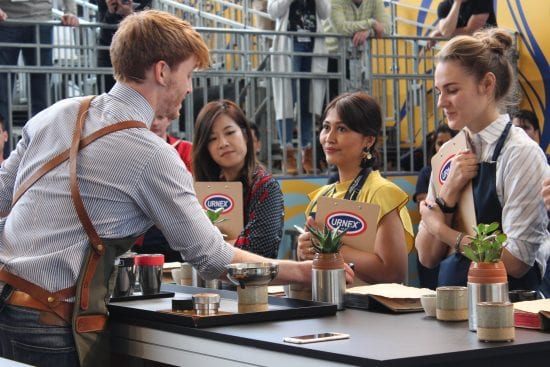
The second coffee I used was a Natural Sidra, which I didn’t receive until just 15 days before Worlds. I felt I didn’t have enough of the Lactic Gesha to make it through Worlds, so I bought this coffee based on trust, having no samples sent, just a long conversation with the team at LPET weighing out our options. This ultimately formed my theme of “trust” and really working to share the story of trust within our industry. To drive this point home, I decided to blend the Gesha and the Sidra together while sharing the story of LPET, and showcasing how by blending these coffees together, I could not only add my own chapter to the amazing story of these coffees, but I could also bring two powerful elements together, leveraging each other’s strengths, tailoring flavors in the cup, and showcasing how they can become something greater than each as an individual. Kind of like the way a barista and a coffee producer can work together to create something truly special and bigger than each of themselves. This industry is all about trust, and if we can really harness it, we can continue to create amazing experiences.
Both of these varieties were anaerobically fermented for over 48 hours, which enhanced the lactic acid contents in the coffees and created tropical fruit tones and an exaggerated tactile sensation.
AR: What expectations did you have going to worlds? What did you hope to gain from this experience?
CT: With less than a month to prepare for the worlds and the hurdles of sourcing a new coffee, completely rebuilding the presentation from scratch and putting aside all day-to-day business, I was really expecting to just go in, have fun, and be myself. My goal was to represent Rosso Coffee Roasters and Canada with pride and enthusiasm. I was both excited and nervous to be in a room with 56 other national champions and to simply learn and absorb anything I could from them. It was a really amazing experience.
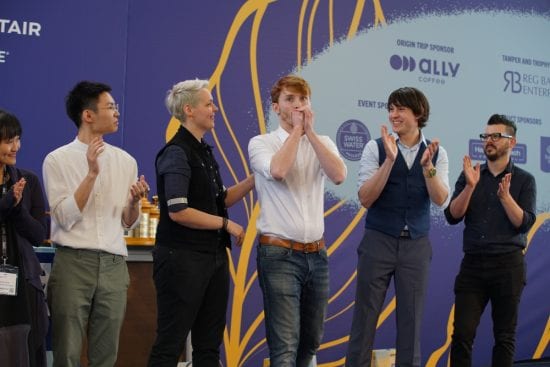
AR: Tell us a little about the coffee scene in Canada. How have you seen it change and what do you hope to see in the future?
CT: The coffee scene in Canada is growing rapidly, with new quality-focused cafés and roasters popping up all over the country. I hope everyone continues to value the importance of hospitality, quality, and sustainability in all stages of the industry. Hopefully together we can work toward minimizing waste, maximizing the members of the value chain, and continuing to share their stories, establishing true relationships through trust and pushing for more sustainable measures from seed to cup.
In Calgary specifically, I’m so amazed with the level of coffee that’s coming out of this city, and I would say that we’re establishing ourselves as the mecca for specialty coffee in Canada. There are so many influential and inspiring Calgarian coffee professionals that I’m grateful to simply be around. I owe a lot of my knowledge and understanding to a large and powerful coffee community that surrounds and motivates me on a daily basis.
AR: How would you describe your competition experience?
CT: It was interesting competing three days in a row, and it was honestly an emotional roller coaster. I found I had difficulty falling asleep at night because of both nerves and excitement, so I shut out a lot of external factors, like social media and my cell phone, and spent a lot of time meditating or stretching. The nerves diminished as the competition wore on, and by the time it was finals, I felt calm and I just tried to have fun while I was out there, just enjoy the moment and be myself. I found it really critical to rest, to semi-isolate myself, and to find a state of focus that allowed me to just be who I am while I was out there doing my thing.
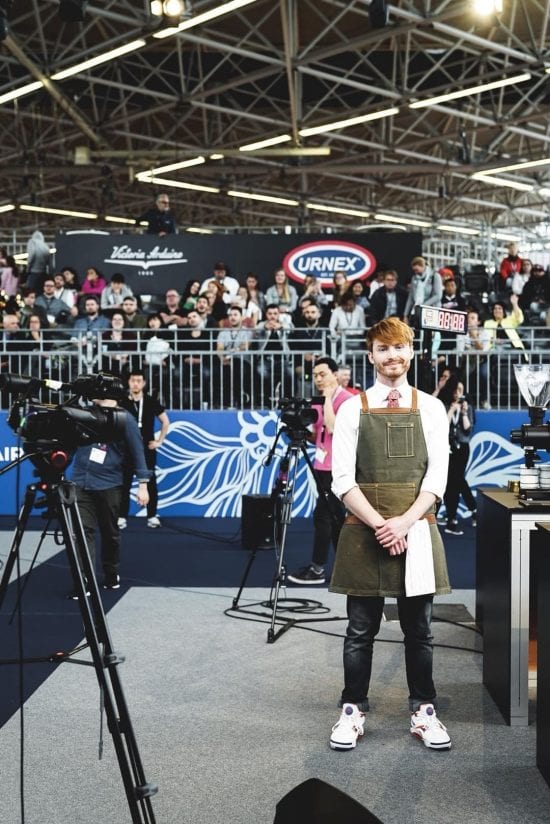
I was also asked about 500 times if I was nervous in the days leading up to the competition. I’d highly recommend you always say no to that question and trick yourself into believing you’re not nervous.
AR: Do you have any advice for current and future competitors?
CT: I’d advise for both current and future competitors a few things. First, you have nothing to lose by simply trying, but you have so much to learn and experience you can gain. Second, dive into the technical score sheet and master each of the categories. I believe the most value for a barista comes from the understanding of technique and the importance of consistency. Work to ace the technical scores and utilize them through your day-to-day service and the sensory side will begin to come into focus. Lastly, keep an open mind, present what you’re passionate about, and be true to yourself. You really have nothing to lose. Trust in your ability, trust in your coffee, and write your story!
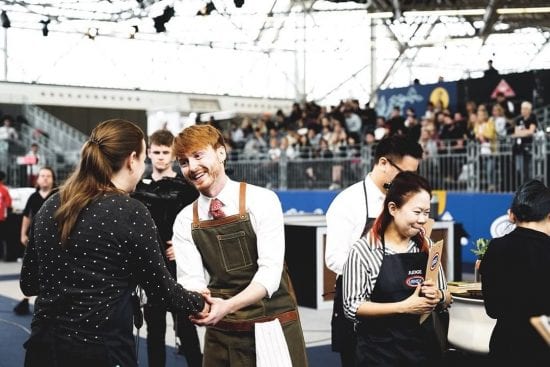
AR: Is there anything you want our readers to know?
CT: Going forward, we’re planning to open our doors to roasters and to sell green coffee that we’re working tirelessly to source. We plan to work with Canadian roasters and build relationships with them, similar to what we’re doing at origin. We have some really amazing coffee from Rwanda, Burundi, Myanmar, Costa Rica, Guatemala, Brazil and Colombia, and we’d really like to share these beauties. We believe the quality of raw material we use is the most important aspect, and it’s ultimately defined through passionate coffee producers. So we’re hoping we can improve Canadian coffee by sharing fresh-crop coffees with amazing stories and amazing people behind them.
I personally write about all of the coffees we purchase through our online journal. We’ve just launched a new internal certification program as well to help communicate the story of each coffee. You can find all of that here.

